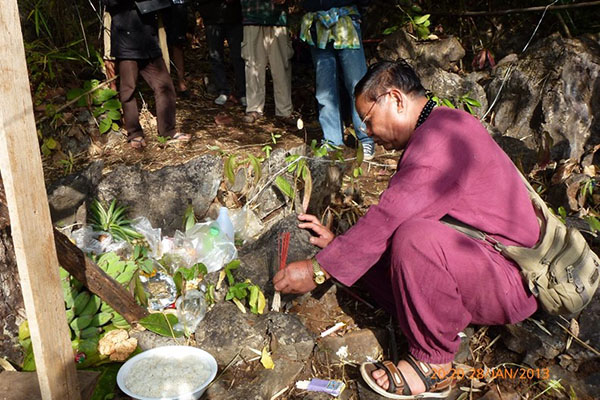The Challenge of Archaeological Interpretation and Practice that Integrates between the Science of the Past and Local Knowledge | ความท้าทายของการตีความและปฏิบัติการทางโบราณคดีที่บูรณาการระหว่างวิทยาศาสตร์ของอดีตกับภูมิปัญญาท้องถิ่น
DOI:
https://doi.org/10.26721/spafajournal.v4i0.632Keywords:
archaeological interpretation, contemporary archaeology, ethics, local knowledge, knowledge production, Pang Mapha, การตีความทางโบราณคดี, โบราณคดีร่วมสมัย, จริยธรรม, ภูมิปัญญาท้องถิ่น, การผลิตความรู้, ปางมะผ้าAbstract
Contemporary archaeologists can no longer focus only on scientific research, they must also work with different interest groups whose use of archaeology may have positive and negative consequences. The dichotomy of foreigner versus local has been prominent in the discourse of the post-modern era. Archaeologists seem to be aware of their ethical and political roles when archaeology is used for knowledge production, economic development, and other public policy goals at the local, national and international levels. Consequently, in recent years the ethical issues involved in working with multiple communities or multi-ethnic groups have become important concerns for archaeologists globally. In the case of Thailand, most archaeologists generally have not focused on these issues, although there are many minority ethnic groups there, especially near the borders with neighboring countries. The challenge now is to integrate professional theoretical and methodological practice with local wisdom from multiple communities even though these are forms of knowledge different from a “scientific” world view. This paper considers two major topics: (1) how archaeologists negotiate their ethical responsibilities in working with the multiple communities and, (2) how archaeologists can incorporate local knowledge into archaeological practice and interpretation, using an example from Highland Pang Mapha in Mae Hong Son province Northwestern Thailand.
นักโบราณคดีร่วมสมัยไม่สามารถเน้นเฉพาะการทำวิจัย พวกเขาต้องทำงานร่วมกับกลุ่มคนที่มีความสนใจในงานโบราณคดีที่หลากหลายอันส่งผลกระทบทั้งทางบวกและทางลบ การแบ่งแยกระหว่างคนนอกและคนท้องถิ่นเป็นกระแสสำคัญในวาทกรรมสมัยหลังสมัยใหม่นิยม นักโบราณคดีตระหนักถึงบทบาททางจริยธรรมและการเมืองเมื่อโบราณคดีถูกใช้สำหรับการผลิตความรู้ การพัฒนาเศรษฐกิจ และเป้าหมายของนโยบายสาธารณะอื่นๆ ในระดับท้องถิ่น ประเทศ และนานาชาติ หลายปีที่ผ่านมามีผลกระทบในประเด็นจริยธรรมที่เกี่ยวข้องกับการทำงานร่วมกับชุมชนที่หลากหลาย หรือกลุ่มชาติพันธุ์ต่างๆ กลายเป็นสิ่งที่สำคัญสำหรับนักโบราณคดีทั่วโลก กรณีของประเทศไทย นักโบราณคดีส่วนใหญ่ไม่ได้ให้ความสำคัญกับประเด็นเหล่านี้ แม้ว่าจะมีกลุ่มชาติพันธุ์ที่เป็นชนกลุ่มน้อยจำนวนมากในประเทศไทย โดยเฉพาะบริเวณชายแดน ความท้าทายในปัจจุบันคือการเชื่อมโยงแนวคิดทฤษฎีและระเบียบวิธีปฏิบัติทางโบราณคดี กับภูมิปัญญาท้องถิ่นของหลากหลายชุมชน แม้ว่าจะมีความแตกต่างไปจากโลกทัศน์ทางวิทยาศาสตร์ บทความนี้พิจารณาสองประเด็นหลัก คือ 1) นักโบราณคดีต่อรองความรับผิดชอบทางจริยธรรมในการทำงานกับชุมชนหลากหลายกลุ่มอย่างไร 2) นักโบราณคดีสามารถหลอมรวมความรู้ท้องถิ่นเข้ากับการทำงานปฏิบัติและการตีความทางโบราณคดีอย่างไร กรณีศึกษาจากพื้นที่สูงในอำเภอปางมะผ้า จังหวัดแม่ฮ่องสอน ภาคตะวันตกเฉียงเหนือของประเทศไทย

Downloads
Published
How to Cite
Issue
Section
License
Copyright (c) 2020 SEAMEO SPAFA and Author

This work is licensed under a Creative Commons Attribution-NonCommercial-NoDerivatives 4.0 International License.



